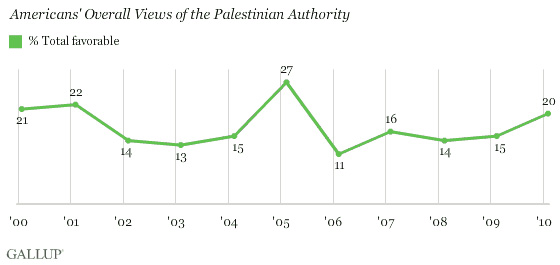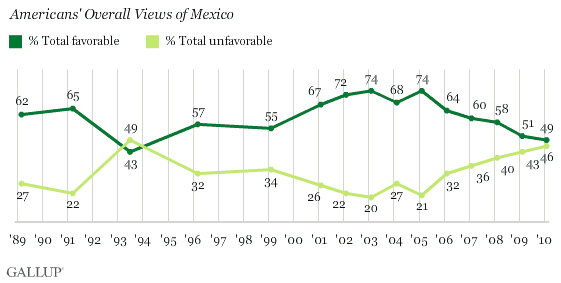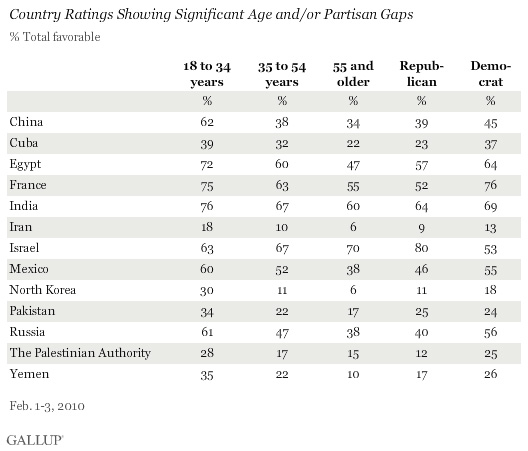
|  |  |  Editorials | Issues Editorials | Issues  
In U.S., Canada Places First in Image Contest; Less than Half of Americans View Mexico Favorably
 Lydia Saad - Gallup Lydia Saad - Gallup
go to original
February 25, 2010

Princeton, NJ - Americans' perceptions of 20 nations that figure prominently in the news or U.S. foreign policy held quite steady in the first year of the Obama administration. Canada retained its top position in Gallup's annual country ratings, with 90% of Americans viewing it favorably, unchanged from 2009. Iran continues to rank last, with 10% this year.



Eight of the countries rated in this year's World Affairs survey are viewed favorably by a majority of Americans. Great Britain nearly matches Canada in favorability, while smaller majorities hold positive views of Germany, Japan, Israel, India, France, and Egypt. Mexico and Russia are both about as likely to be viewed unfavorably as favorably, while 10 countries are generally viewed unfavorably.

Yemen was included on the list for the first time this year, amid news that the Christmas Day underwear bomber had ties to a Yemen-based al Qaeda terrorist group. Its 21% favorable rating is among the lowest in the Feb. 1-3 poll, although about one in four Americans have no opinion of that country.

Only Iraq saw a statistically significant, albeit small, drop in favorability over the past year on the basis of the combined percentages viewing each "very favorably" or "mostly favorably." Most countries' ratings are essentially unchanged, while favorability toward Russia and the Palestinian Authority is up slightly.

Partial Rebound in Views of Russia

After dipping to 40% in 2009 - most likely in response to the 2008 military conflict between Russia and Georgia - favorability toward Russia has recovered somewhat to 47%; however, this remains lower than where it stood for much of the past decade.

The historical high point for positive U.S. feelings toward Russia was 66%, first reached in 1991 and repeated in 2002. However, favorability toward Russia plummeted to 41% in March 2003, after that country sharply opposed the United States' launching of the Iraq war. (U.S. public opinion of France and Germany, two other countries opposed to the war, also turned more negative in 2003.) By February 2004, Russia's favorability score was back to 59%, and it remained above 50% until 2008.



Palestinian Authority Sees Slight Improvement

Americans' views of the official governing body of the Palestinian people - the Palestinian Authority - have been decidedly negative over the years. However, there was a slight improvement in views over the past year, from 15% viewing the Palestinian Authority favorably in 2009 (and just 11% after the Hamas group won the Palestinian elections in 2006) to 20% today.

Favorability toward the Palestinian Authority was quite low for most of the Bush administration, except for February 2005, when the two sides had just announced an informal truce during Mideast peace talks.



Favorability Toward Mexico Still Dampened

Although the two-percentage-point decline in Mexico's overall favorable rating between 2009 and today is not significant, the result is that, for the first time since 1993, fewer than half of Americans have a favorable view of the United States' southern neighbor. Mexico's image in the U.S. has generally been in decline since 2005.

Heightened U.S. attention to illegal immigration from Mexico, as well as to intensifying violence in the Mexican drug war, could explain the deterioration of Mexico's U.S. image in recent years.



Notable Differences

Most of the countries rated this year are viewed more favorably by young adults (aged 18 to 34) than by those 55 and older. Additionally, some are viewed differently by Republicans and Democrats.

• As a result of the generational differences, Egypt, China, Russia, and Mexico are all viewed favorably by at least 6 in 10 young adults, but by fewer than half of adults 55 and older.

• Significant age gaps exist in favorability toward Cuba, Yemen, Pakistan, North Korea, the Palestinian Authority, and Iran, although most members of all age groups still view these countries negatively.

• France, Russia, Cuba, North Korea, the Palestinian Authority, and Yemen are all viewed more favorably by Democrats than by Republicans. Israel is the only country rated this year that is viewed more favorably by Republicans.



A handful of countries - Canada, Great Britain, Germany, Japan, Saudi Arabia, Iraq, and Afghanistan - receive similar ratings from the broad age and partisan groups.

Survey Methods

Results are based on telephone interviews with a random sample of 1,025 national adults, aged 18 and older, conducted Feb. 1-3, 2010. For results based on the total sample of national adults, one can say with 95% confidence that the maximum margin of sampling error is ±4 percentage points.

Interviews are conducted with respondents on land-line telephones (for respondents with a land-line telephone) and cellular phones (for respondents who are cell-phone only).

In addition to sampling error, question wording and practical difficulties in conducting surveys can introduce error or bias into the findings of public opinion polls.

 |

 |
|  |



